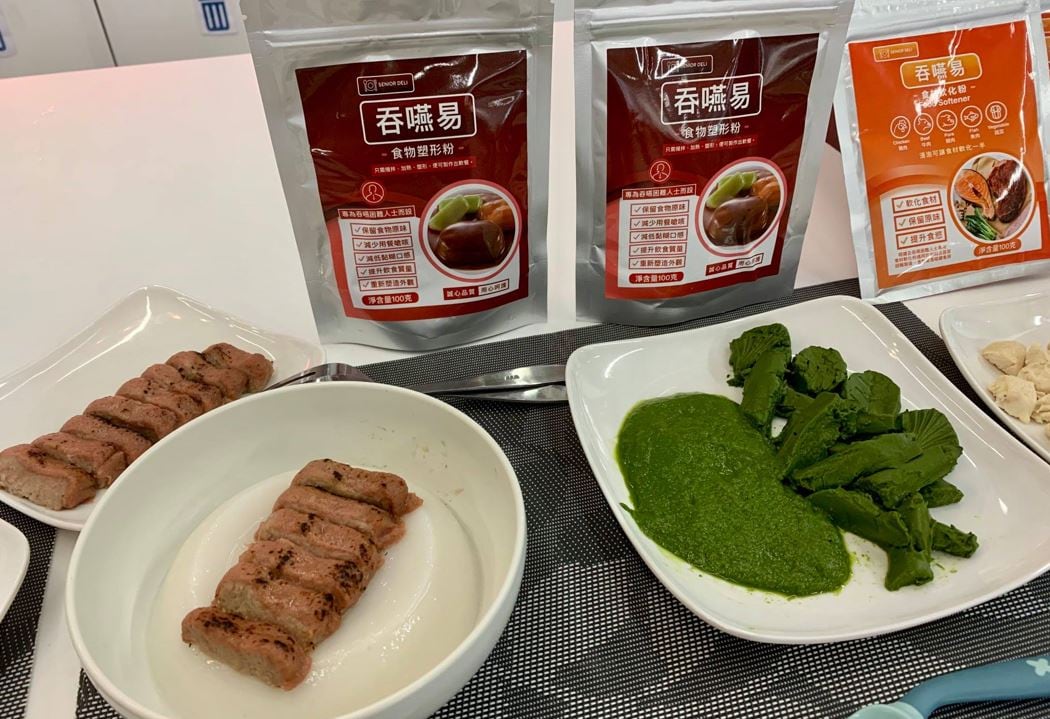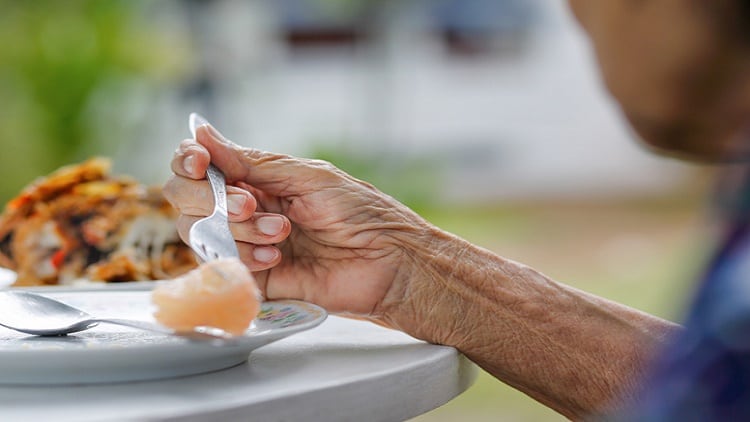Dysphagia is a swallowing or chewing difficulty which affects around 30% of elderly. People with dysphagia have problems eating, limiting their food options, consequently affecting their appetite, and may lead to malnutrition.
Senior Deli has developed products for people with dysphagia including a food and drink thickener, food softener, food gellant, pre-packaged soft meals, and whey protein to help these people maintain a balance diet.
The firm, launched in 2019, says there was a clear market gap for food products for people with chewing or swallowing problems in the region.
According to one of the founders, Aggie Au Yeung, the firm initially wanted to create frozen soft meals such as those readily available in Japan’s supermarkets and convenience stores. However, it was difficult to produce them at a cost point that would be attractive to elderly consumers.
So, they explored an enzyme technology, which helps soften or break down foods, making it easier to shape or chew the foods.
Product portfolio
One of the products developed by Senior Deli is a food gellant, which is added to foods, blended and heated which forms a paste that can be reshaped into any form.
It is suitable for starchy foods such as rice, vegetables, meat and fish. Au Yeung said this is different from other soft meals which are typically made with gelling powder or starch.
According to her, food gellants are frequently used in care homes for its ability to prepare large amounts.
In general, over 90% of nursing homes in Japan and over 40% in Hong Kong use food gellant to make soft meals.
The firm also developed a food softener, which modifies the texture of food and is used to soften meat and vegetables up to 40%, while retaining its original form and flavour.
There is also a ramge of prepacked soft meals ranging from soft, minced to purees to meet the needs of the elders according to their swallowing abilities. These foods are made using its technology of softener and ultrasound, to soften foods by 20%.
Senior Deli also developed a clear thickener, which can be used in both hot or cold foods and liquids as it is highly soluble, and thickens in 30 seconds.
The latest product from Senior Deli is a whey protein powder which helps increase muscle mass and satiety while preventing muscle loss.
This came after feedback from care homes, which typically add whey powder into congee, water or milk to increase the elderly protein intake. However most of the whey protein brands are imported, and tend to contain flavours such as vanilla or orange.
“When added into the milk, or congee, the elderly will complain about taste. So, we wanted something which is flavourless, and they can put in anything,” Au Yeung said.
Business model
While the firm was set up in 2019, it only started selling in December 2020.
Senior Deli’s business model is predominately B2B (80%) and the rest D2C.
It currently supplies products to over 200 nursing homes and hospitals in Macau, Hong Kong and China.
“Our strategy is to get into more care homes to help more elderly with our lower price option, because in some places the elderly cannot afford to use such products,” she said.
The firm is hoping to approach the 800 over care homes in Hong Kong alone, although Au Yeung said the COVID-19 pandemic had affected the business, with some homes deferring demos.
According to a recent article by Lina Chow published in Age and Ageing, about 15% of older people (aged 80 and above) live in care homes in Hong Kong, one of the highest proportions in the world.
Senior Deli is following the footsteps of Japan, which is at the forefront of soft meals in Asia.
“The percentage of people who have dysphasia in care homes is larger than the group that stay at home by themselves,” so promoting in those channels was crucial to bring awareness.
After it became popular and common in the care homes for the Japanese market, the companies started doing prepared meals selling into supermarkets for the wider population.
According to Au Yeung, it took Japan one to two decades to grow its B2B and D2C channels.
For its D2C, Senior Deli currently sells into supermarkets and pharmacies. It also has a presence on e-commerce platforms such as Tmall and JD in China, and HKTVMall in Hong Kong.
In the past two months, the firm managed to hit monthly revenue of around HK$500,000 (US$65,000).
The company is planning to launch products on Amazon US in the next few months, and also hopes to work with distributors there.
Senior Deli operates out of a factory in Hong Kong, as well as OEM factories in China.
The firm has research facilities at the CUHK, and HKUST Shenzhen Research Institutes.
Future plans
Au Yeung said the firm was determined to develop more products for this range of patients.
“Not many people are listening to the needs of the elderly. Compared to young children, parents are willing to splurge to buy nutritious and high quality foods for their infant and toddlers, but for the elderly, people tend to be more cautious about the cost. It could be the elderly themselves who cannot afford too expensive food products, or they don't want to put too much pressure on their children to buy such products.
“So, we hope that we can create more suitable products for the elderly at an affordable price.”
The company has participated in several competitions, receiving more than RMB 10 million (US$1.5m) in prizes.
It has also received subsidies from the Hong Kong and Chinese governments of over RMB 13 milliion (US$2m) cash and RMB 1.8 million (US$280,000) in annual rent.
Senior Deli was announced as a winner at the Future Food Asia awards 2021 and will receive US$100,000.




